In performance with his former band Outkast, the celebrated rapper, singer and musician Andre 3000 could be a riveting blur – dancing in lockstep with the pulse, clowning, doing frontman pantomimes. In other words: The usual.
The people who came to see him at the Roots Picnic this past weekend no doubt hoped for a glimpse of that Andre Benjamin. Ever since the release of his instrumental New Blue Sun last year, and increasingly on the tour to support it, he’s heard a steady chorus of “Put down the flute and play the hits.”
He walks onstage knowing that he is not living up to the expectations of the audience. That what they want is the echo of something that’s literally galaxies away.
And he doesn’t care.
“This is the realest shit you’re gonna hear all weekend,” he told the Philadelphia crowd before beginning what became an epic journey of slow-cresting chords and stately, profoundly simple melodic declarations. Playing an assortment of flutes from different parts of the world, he groped in a deliberate way for the sweet notes, and held on when he found them. He and the flat-out incredible musicians with him – multi-instrumentalist Carlos Niño, guitarist Nate Mercereau, keyboardist Surya Botofasina, and percussionist Deantoni Parks, who’ve recorded several pathbreaking new-ambient titles for International Anthem – were immersed in a measured, reserved, of-the-moment conversation. They were not “performing” in the traditional sense. They were on a collective search for healing vibrations – sound as tactile sensation, sound as salve. Sounds that could lift them up. Not some festival audience.
At a show in Brooklyn in January, Benjamin expressed this in the most direct terms, telling listeners that the band “wasn’t really performing — not for y’all.” This music was for the “air, trees, water.” So there.
At the Roots picnic, he said similar things, acknowledging the bizarro nature of his recent script flip: “I know many of you were saying “What the fucking fuck?” when you heard I was playing flute. I get it – because I was saying that too.” He went on to share how, during the pandemic, he became captivated by the instrument, then obsessed with it. He burrowed into its nuances. Learned how to personalize its tones. And discovered that when playing, he became calm. In an earnest voice, he explained that making sounds with air led him to a mental space that helped him cope during the disquieting months of lockdown.
Benjamin went on to re-tell the stories he’d offered the media when New Blue Sun dropped – about meeting Nino at the grocery store, about getting together in Nino’s garage (!) to explore music in an open-ended way with no songwriting goals. The Andre 3000 fans, a smallish subset of those attending the hiphop-dominated Roots Picnic, likely knew these things, but as he spoke, his tone conveyed endearing earnestness and a kind of awe – as though this sound-making had been a kind of lifeline. For him.
As in: I make these tones. They bring a certain vibrational energy and solace to my being. If you give them a few minutes, they might do something for you, too. No sweat if not.
Bamboozled by the left-field genre pivot when it was announced, the media snickered loudly and often at the woo-woo-ness of an esteemed figure like Andre 3000 swapping narrative songcraft for swirling spa sonics.
That’s the low-hanging fruit. As this endeavor has evolved, it’s become clear that what Andre 3000 is actually suggesting is something more radical – a sensibility pivot. A change in what music might be for.
His transfixingly unshowy and unperformative appearances argue for sound as its own gratifying and galvanic presence. He has moved away from music as commercial pursuit in order to pursue music as a kind of ritual chase, as service, as an intimate act of exploration. The quest he’s on is for something other than escape; relevant questions include “Were you stirred?” and “Did you get healed?”
In this way, he and his colleagues are pursuing, together, an endeavor similar to that of Alice Coltrane and the spiritual jazz pioneers, aimed at changing consciousness.
Except where the spiritual jazz of the early ‘70s was propelled by some degree of idealism (the belief that sounds could catalyze a widespread shift of awareness), Andre 3000 has few illusions about evangelizing this gospel. His music carries traces of heavy forefathers – his playing on an ocarina-like instrument summoned the auras of Rahsaan Roland Kirk and Yusef Lateef – but he is completely disinterested in the muscle-flexing of contemporary jazz improvisation. He moves at half jazz speed. He’s going to interior places, looking for the divine in the simple harmonious triad. Maybe that’s selfish. Maybe the search for peace is inherently selfish too. Doesn’t bother him: Onlookers are welcome to witness his ritual ablutions but are completely irrelevant to his work.
At the risk of sounding too Ayn Rand for the room, this is among the more encouraging – and, yes, healthy – expressions of artistic intent to come along in a long while. Here we have a star who has been to the music-business mountaintop and experienced success at an elite and incredibly frenzied level. And he’s not trying to go back there! Benjamin has no illusions about bringing the Outkast audience – or any audience – along, either. What he’s doing defies all the conventional market metrics: He currently approaches the act of creating music as a spirit-enhancing thing that exists apart from the profoundly broken apparatus of the business. His path doesn’t go through the streaming services, doesn’t require social media oxygen, doesn’t need anything from the approval matrix. His current work is for him. His clarity on this point is everything: The audience might not “get” what he’s doing, but his motives are beyond challenge. He’s not doing this as a save the world move, or some sort of crossover move. He believes. And that’s all that matters.
At one point during the Roots Picnic set, Andre 3000 invited listeners to breathe with him. “Whatever you’re going through, stuff with your career or your life that’s troubling you, let it out. Let it out.” The sounds behind him had the swooshing animation of wind dancing across a pond. They were simple and enchanting, encouraging contemplation. As they circulated, it was possible to hear mass exhalation happening in the crowd, and sense the collective heartrate going down a few ticks.
In a typical performance context, such a New Age moment would seem off, an invitation to ridicule. There he goes, doubling down on the Kumbaya. Yet on Andre 3000’s stage it became something else – an invitation to consider other paths and other modes of being. He wasn’t saying hey, follow me. Through those haunting and gently evolving sounds, he was just sharing what happened to him, offering his unlikely transformation as proof that transformation is possible.
We need more like him.

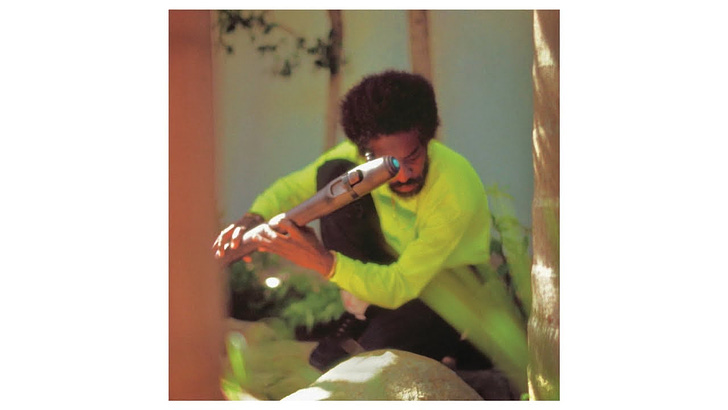


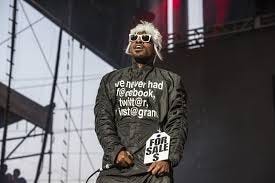
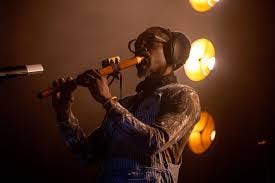
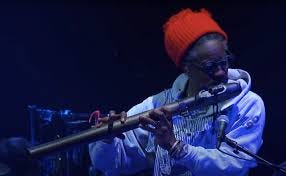
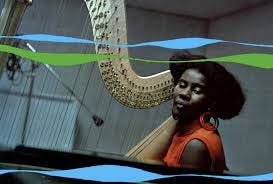
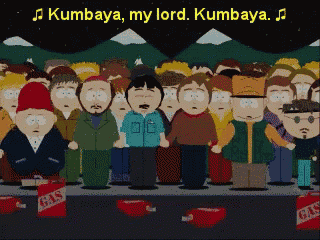

Spot on, as they say. This man oozes talent - and his latest incarnation is incredible. I've been an OutKast fan since I saw them in Asheville, NC back in 2001. The comparison to Alice Coltrane is very apt - she was a visionary; it's great to see this style and genre of music continued. Thanks for this post - I'll be downloading some Andre!
I think the music may or may not ever be better, simply because André Benjamin is a newbie to this whole approach and way of making music. It's not like none of his previous experience applies, but still — we're hearing somebody basically four years into their practice. When I think about myself and my peers doing this kind of thing, even my peers just out of their undergrad have been playing seriously since they were in elementary school and have more experience than Benjamin. It's just that he has the platform to present his work even as a neophyte and, say, an 11-year-old does not. And just as an 11-year-old might be accompanied by a more experienced teacher, that teacher is not going to "save" the performance — it's only going to be as good as the 11-year-old can muster. I don't know if we're ever going to hear Benjamin after 20 years of fluting and 70 years of life experience, but I'm rooting for him. I'm not sure I'd be this forgiving with anybody else, but I think Benjamin is the right guy to put his 4-year-old-flute-self out there for people to see and hear that change is possible. Do I wish that people like Doug Ewart, J. D. Parran, and Nicole Mitchell were getting this kind of press for their fluting in free improv? Hell, yeah. But I'll welcome Benjamin to the fold with open arms.